 |   | |
| European Climate Adaptation Newsletter | Issue September 1, 2022 | |
EU policy and EEA activities | Climate and Health Observatory|Climate-ADAPT | Research and assessments | Transnational, national and local | Events | Subscribe | ||
| EU policies and EEA activities | |||
1. 118 regions and local authorities join the EU Mission for Adaptation to Climate Change On 7 June 2022, the European Commission announced the first 118 regions and local authorities that will participate in the EU Mission for Adaptation to Climate Change, which will support the European Green Deal and the EU Climate Adaptation Strategy. << Read more | 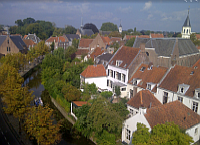 © Fokke de Jong | ||
2. More regions and communities are invited to join the EU Mission on Adaptation to Climate Change The objective of the EU Mission on Adaptation to Climate Change is to support 150 regions and communities to accelerate their transformation towards climate resilience by 2030. A survey is available for regions and communities to express their interest in joining the Mission. The first signatories to the Mission Charter have been announced at the Mission Forum. On 29 September 2022, a second batch of signatories will be announced during the Research & Innovation (R&I) Days. | 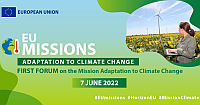 © European Commission | |
3. Funding opportunities to support research projects on adaptation to climate change are open Six calls under the Horizon Europe Work Programme 2021-2022 are open, which will contribute to implementing the EU Mission on Adaptation to Climate Change. The calls will close on 27 September 2022. << Read more | 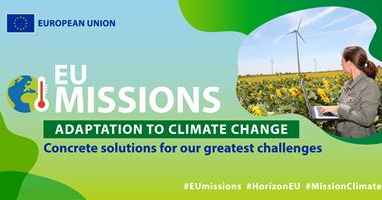 © European Union | |
4. European Commission proposes Energy Performance of Buildings Directive with mandatory adaptation provisions A proposal for revising the Energy Performance of Buildings Directive adopted by the European Commission in December 2021 includes several provisions on adaptation and climate resilience. << Read more
|  © Melika Kovcic, Climate Change PIX /EEA | |
5. European Commission reveals winners of LIFE Awards 2022 On 31 May 2022, the LIFE Programme announced the five winners of the annual LIFE Awards at a ceremony held during EU Green Week. The LIFE Awards recognise the most innovative, inspirational, and effective LIFE projects in three categories: nature protection, environment, and climate action. The LIFE VinEcoS (Optimizing Ecosystem Services in Viniculture facing Climate Change) project was the winner for climate action. << Read more |  © LIFE programme | |
6. Call announcement: Urban Agenda for the EU Partnerships on Greening Cities and Sustainable Tourism The call for expression of interest aims at establishing Partnerships under the Urban Agenda for the European Union (UAEU): Greening Cities and Sustainable Tourism. Partner cities, Member/Partner States, and other organizations are encouraged to apply. The call will remain open until 16 September 2022. << Read more | 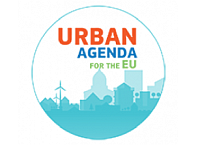 © European Commission | |
| ΕΘ | ||
7. Towards ‘just resilience’: leaving no one behind when adapting to climate change The briefing from the European Environment Agency examines how climate change affects vulnerable groups and how equitable adaptation actions can prevent or reduce these impacts. The publication provides an overview of knowledge and practice for just resilience in Europe concerning social impacts of adaptation and resilience. << Read more |  © EEA | |
8. European handbook for Sustainable Development Goals voluntary local review The 2022 edition of this handbook provides policymakers and urban practitioners with a consolidated method and examples of indicators that local and regional governments can use to monitor the achievement of the Sustainable Development Goals (SDGs). The handbook includes detailed and updated information on 72 indicators and related data sources, enabling cities to measure their progress toward the 2030 Agenda for Sustainable Development. << Read more |  © European Commission | |
9. Consultation on European Research & Innovation Roadmap for Nature-based Solutions The EU NetworkNature project is facilitating the development of the EU R&I Roadmap for Nature-based Solutions (NbS) and is now opening a public consultation on its first draft until 18 September 2022. The roadmap aims to bring forward key levers for R&I to help achieve the EU goals for NbS development and deployment and further bridge knowledge needs and implementation gaps in climate adaptation and disaster risk reduction. << Read more |  © Suleyman Uzumcu, WaterPIX / EEA | |
10. Ukraine joins the LIFE programme for environment and climate Ukraine is the first non-EU country to join the programme. LIFE’s support could help to restore the Ukrainian environment after the destruction brought about by the Russian invasion. Ukrainian applicants can already submit proposals under the 2022 LIFE calls for proposals. << Read more |  © LIFE Programme | |
| European Climate and Health Observatory | ||
11. New climate change country profiles show key health risks and priority areas for action in the European Region The World Health Organization (WHO) and the United Nations Framework Convention on Climate Change (UNFCCC) have launched the Health and Climate Change Country Profiles to give an overview of critical areas for action to combat these threats and to provide links to available resources. Developed in collaboration with national health services, they summarize evidence of the climate hazards and health risks facing countries. | 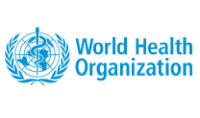 © WHO | |
12. New project launched on strengthening Europe’s resilience to emerging health threats Tackling the emergency and transmission of zoonotic pathogens requires developing novel indicators, early warning systems, tools for decision-makers, and evaluating adaptation and mitigation strategies. The EU-funded IDAlert project (Infectious Disease decision-support tools and Alert systems to build climate Resilience to emerging health Threats) will build on its ties with the European Climate and Health Observatory and the Lancet Countdown in Europe to guarantee long-term sustainability, policy impact, and uptake. << Read more |  © IDAlert project | |
| Climate-ADAPT – new features | ||
13. New Climate-ADAPT section on Nature-based solutions and just resilience The EU Adaptation Strategy strongly emphasises on Nature-based solutions (NbS) and Just resilience as cross-cutting priorities to boost the implementation of adaptation to climate change in Europe. A new section on ‘Key EU actions’ presents the relevant EU policy framework, EU knowledge development and funding, and how the EU supports implementation, monitoring and reporting of those key EU actions in Europe. |  © Carpathian Development Institute | |
14. New and revised case studies showing just resilience initiatives New and upgraded case studies published on Climate-ADAPT show how just adaptation initiatives address the most vulnerable population in Europe. After devastating heatwaves and considering projections that predict an increasing frequency and duration of heatwaves in the future, the City of Paris embarked on developing a range of initiatives to address this threat recognising that different social groups and different areas of the city have unequal vulnerabilities. The city of Barcelona is undertaking measures to keep housing prices low and prevent the effects of green gentrification to green Barcelona in a socially just way. << Read more << Read more |  © Barcelona City Council | |
15. Strong increase in the number of visits on and page views of Climate-ADAPT A strong increase in visits and page views of Climate-ADAPT in the past year is apparent since measuring the number of visits and pageviews of Climate-ADAPT in 2013 and reporting in the Performance Reporting from 2019 onwards. Since the Summer of 2021, the number of visits has exceeded 1000 every day, and around 1800 pages are requested daily. The Case Studies and the Country profile pages are among the most visited key sections, alongside the EU Policy section, the Adaptation Support Tool, and the Urban Adaptation Support Tool. << Read more |  © EEA | |
| Research and assessments | ||
16. WMO State of the Global Climate in 2021 report: four key climate change indicators break records Four key climate change indicators – greenhouse gas concentrations, sea level rise, ocean heat, and ocean acidification – set new records in 2021. According to the World Meteorological Organization (WMO), this is another clear sign that human activities are causing planetary- scale changes on land, in the ocean, and in the atmosphere, with harmful and long-lasting ramifications for sustainable development and ecosystems. In addition, Western Europe experienced some of its most severe flooding on record in mid-July, associated with large economic losses in Germany. << Read more |  © David Kanigan / Pexels.com | |
17. Bonn Climate Change Conference 2022 negotiation outcomes on climate action During the 56th session of the subsidiary bodies Bonn Climate Change Conference in June 2022, all Parties to the UNFCCC came together to make progress on technical issues regarding both mitigation and adaptation and prepared decisions for adoption at the UN Climate Change Conference (COP27), taking place in November 2022. << Read more |  © UNclimatechange | |
18. New Global Drought Observatory report published The Global Drought Observatory (GDO) of the Copernicus Emergency Management Service (CEMS) of the Joint Research Centre (JRC) recently published a report that analyses the impacts of the severe drought that affected large areas of Europe and provides forecasts for the upcoming months. << Read more
| 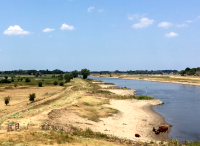 © Eva Merrild | |
19. Kick-off meeting held of the Network of Drought Observatories in the EU Droughts pose increasing risks in Europe and are an ever-bigger cause for concern as their impacts are more frequently and severely felt across different sectors. The Copernicus CEMS European and Global Drought Observatories (EDO and GDO) monitor and forecast droughts on the European and Global scale. A two-day kick-off meeting in June 2022 welcomed around 120 participants from 29 countries and highlighted how efforts to monitor and forecast droughts had been scaled up in the wake of recent droughts in the EU and beyond. << Read more |  © Matt Palmer / Unsplash | |
20. Water4All Joint Call 2022 pre-announcement Thirty-four Funding Agencies from across Europe and abroad are pre-announcing a joint transnational call for research and innovation projects on “Management of water resources for increased resilience, adaptation, and mitigation to hydroclimatic extreme events”. The call is expected to open on 1 September 2022 << Read more |  © Water JPI | |
21. Cities are often 10-15 °C hotter than their rural surroundings A recent global study conducted by the Joint Research Centre examines the difference between surface temperatures of urban areas and their neighbouring rural areas in summer. The scientists measured that surface temperatures in cities were sometimes up to 10-15°C higher than in their rural surroundings. << Read more |  © JPI Climate | |
The knowledge brief, prepared by the EU-funded NetworkNature project, aims to disentangle the complexities associated with integrating research and policy concerning Nature-based Solutions (NbS). The brief provides an overview of the NbS knowledge gaps regarding climate adaptation and mitigation measures in restoring ecosystems. This supports policy makers in better understanding the research needs, which can strengthen the implementation of NbS. << Read more | 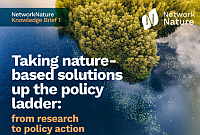 © EU NetworkNature project | |
23. Brochure about Impact of Natural Hazards on Hazardous Installations The Organisation for Economic Co-operation and Development (OECD) has published a brochure aiming to raise awareness and listing the work and resources of international organisations that support understanding Natural Hazards at Hazardous Installations (Natech) risks. The brochure targets a broad audience, including industry, public authorities, and practitioners involved in industrial safety and civil protection. << Read more |  © Kati Mattern | |
The following chapter in the Open Access Journal 'Urban Green Spaces' includes information on the prototypes developed and tested by the EU LIFE-myBUILDINGisGREEN project to improve resilience in scholar and social buildings using autochthonous vegetation. These prototypes (building adaptation) of nature-based solutions are applied on walls, roofs, playgrounds, and exterior surfaces of three pilot buildings in Portugal and Badajoz (Spain). << Read more |  © Miguel Vega (CC BY) | |
| Transnational, national and local activities | ||
25. Estimation of costs resulting from climate change in Germany A recently published study estimates the costs in Germany of the exceptionally hot and dry summers of 2018 and 2019 and the floods, on the Ahr and Erft rivers, in 2021. The research shows that tangible losses resulting from extreme weather events amount to at least 80 billion euros since 2018. The study was commissioned or accompanied by the German Federal Ministry of Economics and Climate Action (BMWK) and the Federal Ministry for the Environment, Nature Conservation, Nuclear Safety and Consumer Protection (BMUV). | 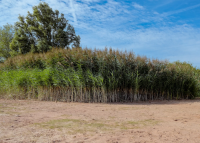 © Lars Schneider / Unsplash.com | |
One year after the start of the LIFE Archiclima project, aiming at effectively supporting property managers and owners in building resilience to the threatening effects of climate change, the project plans to convert up to around 2000 m2 of impervious paved surfaces into lawns and rain gardens located directly in front of passenger terminals of the Katowice Airport. The applied Nature-based Solutions are intended to reduce the temperature during the increasingly frequent heat waves and increase the facility’s and its users’ safety in the event of heavy rains and the risk of flash floods. << Read more about the LIFE Archiclima project << Read more about and project background information in the LIFE Database |  © Investeko S.A. | |
27. Recommendations for conducting climate risk assessments at the municipal level Given the ever-increasing progress of climate change, assessing the risks is becoming increasingly important. Especially at the municipal level, the effects of climate change need to be identified and ensuing risks be assessed for effective precautionary action to be taken. The recommendations provided in the paper from the German Environment Agency (UBA) facilitate the preparation and implementation of climate risk assessments at the municipal level by taking the international standard “Adaptation to climate change – Guidelines on vulnerability, impacts and risk assessment” (ISO 14091:2021-07) as a basis. << Read more | 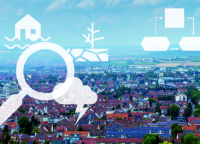 © Adelphi - Istockphoto.com Simon Dux | |
28 . Publication on transformational approach for climate adaptation A publication from the Climate Adaptation Services (CAS) Foundation and Wageningen Environmental Research, published in the Journal Frontiers in Climate, informs about options to extend climate services to support policymakers in developing transformational adaptation strategies. Transformational adaptation strategies aim to address the underlying causes of climate risks through broader development pathways. << Read more |  © ERAnet for Climate Services | |
29. Heat in the inner city: a plea in Germany for more trees and shade Climate change is resulting in an increasing number of hot summer days in Germany. A recent German Environment Agency (UBA) study has systematically investigated how inner city neighbourhoods can realise cooler temperatures. << Read more |  © Kati Mattern | |
| Events |
<< Read More
<< Read More
<< Read More
<< Read More
<< Read More
<< Read More
<< Read More
<< Read More |
Citizens can contribute to Europe's energy transition
Dear reader,
Citizens, institutions and businesses can help deploy renewable energy and reduce fuel imports by becoming prosumers who both produce and consume energy. A European Environment Agency (EEA) report, published today, shows that prosumption already exists in many forms and it is expected to grow with enabling policies and better and cheaper technology.





























































